Our Blog
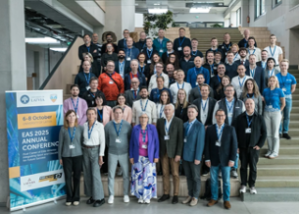 On October 6-8, 2025, the University of Latvia hosted the Annual EAS Conference and General Assembly in Riga, Latvia. Eighty-two delegated from 17 countries attended the event, appreciated the 29 oral presentations reporting dual career programmes, projects, and policies, and enthusiastically participated in three workshops, six activity breaks and two long walks organized to celebrate the 10th Anniversary of the #BeActive Programme.
On October 6-8, 2025, the University of Latvia hosted the Annual EAS Conference and General Assembly in Riga, Latvia. Eighty-two delegated from 17 countries attended the event, appreciated the 29 oral presentations reporting dual career programmes, projects, and policies, and enthusiastically participated in three workshops, six activity breaks and two long walks organized to celebrate the 10th Anniversary of the #BeActive Programme.
During the opening ceremony, Prof. Ilvis Abelkalns, President of the Organizing Committee, welcomed the participants, followed by Enno Ence, Vice Rector of University of Latvia, EAS President Laura Capranica, Raimonds Lazdiņš, President of National Olympic committee, and Agita Ābele, President of Latvian Universities Sports Federation.

A key lecture on the ERASMUS+ funding opportunities on Dual Careers by Izabela Pelczynska (European Education and Culture Executive Agency – EACEA) was crucial to stimulate the envisioning of further collaborations between the participants. Sara Massini, Secretary General of ENGSO, presented the continuum between grassroot and elite sport and signed a Memorandum of Understanding between EAS and ENGSO.
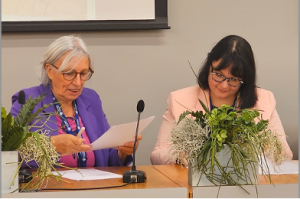
Fernando Parente, FISU Executive Committee member, presented International University Sports Federation (FISU) and Dual Career – a global approach for stakeholders; Edgars Pukinsks, Deputy State Secretary for Sports and Youth Affairs, Ministry of Education and Science Republic of Latvia, addressed the topic Legacy Dual careers – double impact, double responsibility; the session was closed by Joerg Foerster (German University Sport Federation- ADH) who illustrated the Legacy of the FISU World University Games, focusing on the Dual Career of Student-Para-Athletes.
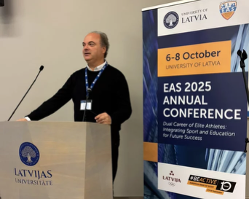
The Bengt Nybelius Scholarship winner Olga Papale from the University of Cassino e del Lazio Meridionale, Italy, presented “Eating Right, Sleeping Tight? The Evaluation of the Student-Athlete Paradox”.
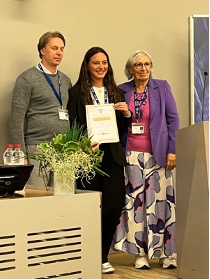
In the afternoon, Felipe Rodrigues da Costa, president of the Brazilian Association of Dual Career presented Challenges and opportunities for implementing and developing a student-athlete support program in the Federal District (Brazil). Then three Working Group Activities addressed the following topics: 1) Dual Career in High School, Transition from High School to University, Dual Career in Universities, and Transition from a Sports Career to Employment.
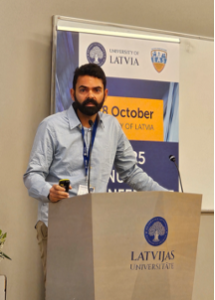
On the second day, the Conference was organized at the Rimi Olympic where Ruta Millere Celmiņa from the Latvian Olympic Committee, presented Elite Level Athletes’ Awareness and Use of Dual-Career Programs in Latvia; Klāvs Olšteins, from the Latvian Basketball Union addressed the topic Basketball – as an opportunity to earn an education; and Jacopo Bouquet from Sport4impact, Italy, illustrated Dual Career from the perspective of SDG17 and PPPs. The following presentations were dedicated to “Focus on the transition from university to the job market: initiative by AU Elitesport” (Anna-Lena Toft Petersen, AU Elitesport, Aarhus University, Denmark), “Updating Dual Career Self-Management in Individualized Mentor-Mentee Collaboration in Sports and Studies” (Agita Ābele, Latvian University Sports Federation), “University mentoring network to facilitate the dual career of athlete-students” (Antonio Sánchez-Pato, Universidad Internacional de La Rioja, Spain), “Sustainability Perceptions Among Young Tennis Players: Insights from the European GreenTennis Project” (María José Maciá Andreu from UCAM Universidad Católica de Murcia, Spain), “Advancing Athlete Employability through Career Mentorship and Education” (Gamze Aydın, Sportstech, Türkiye), and “Improving the support to student athletes with international mobility” (Dorothée Brac de la Perriere, INSA Lyon, France), “Advancing Training and Support for Dual Career Officers Throughout Europe” (Juan Alfonso Garcia Roca, UCAM, Spain), ”Finnish high school student athletes’ perceptions of the implementation of the dual career” (Pertti Huotari, University of Jyväskylä, Finland), “PORTAL Project: Building an Inclusive European Platform for Olympians’ Post-Career Transitions” (Francesca Di Rocco, San Raffaele Open University of Rome, Italy), “ERASMUS Sport Project – FIND ME: University Dual Career Opportunities“ (Nenad Stojiljković, University of Nis, Serbia), “Designing and Evaluating a Stakeholder-Informed Mobile App to Promote Physical Activity in Children: The Walk Around the Earth Erasmus+ Project” (Cristina Cortis, University of Cassino and Lazio Meridionale, Italy), “Elevate DC – Building the Future of Elite Athlete Careers in Latvia” (Owen Southgate, NYSA, Sweden). “Choosing Non Teaching Paths in PETE: An Interpretative Phenomenological Analysis of Dual Career University Footballers” (Rıdvan Çakir, Şırnak University, Turkiye), “Fostering Success in Young Biathletes: Addressing Cultural and Educational Challanges” (Mojca Doupona, University of Ljubljana, Slovenia), “Books, Boxing, Belonging: The Case of Turkish Female Student-Athlete Duo” (Kıvanç Semiz, RTEU, Turkiye), “Perception of barriers in dual careers and the importance given to psychological characteristics in athletes in training: a gender perspective” (Juan Alfonso Garcia Roca, UCAM, Spain), “Winning in life, winning in sport” (Anda Paegle, University of Latvia; “Andara plus”, Latvia), “Supporting High Level Athletes at INSA, France” (Harve Bizzoto, INSA LYON, France), and “Forms of support for the student athletes in the Academy of Physical Education in Katowice” (Rajmund Tomik, Academy of Physical Education in Katowice, Poland).
Pekka Fredriksson, Jani Syrjala, and Ismo Miettinen (Kastelli Upper Secondary Sport School, Oulu, Finland), presented the 2026 EAS Conference to be held in Oulu, Finland, on October 5-7, 2026, whereas Hakan Ege (Collins Innovation, Oslo, Norway) launched the Europe’s Sport Knowledge Hub at https://voicesport.eu.
The Annual General Assembly was directed by the EAS Secretary Ole Keldorf. The members approved the activity report presented by the President Laura Capranica and the financial report presented by the Treasurer Mojca Doupona. The Assembly approved also the Cristina Cortis’ proposal to consider “Sports” as the scientific journal of EAS. Furthermore, the Assembly confirmed Flavia Guidotti, Alejandro Alejandro Leiva-Arcas, and Malene Knudsen as Members of the Next Generation EAS Committee, which will be responsible to assign the 2026 Bengt Nybelius Award and to collaborate to the enhancement of the communication channels of the Network.
During the Conference, the participants had also the opportunity to visit the University of Latvia, the Rimi Olympic Center infrastructure and facilities, the Olympic Museum, the beautiful Riga architectures, and to attend the Gala Dinner.

